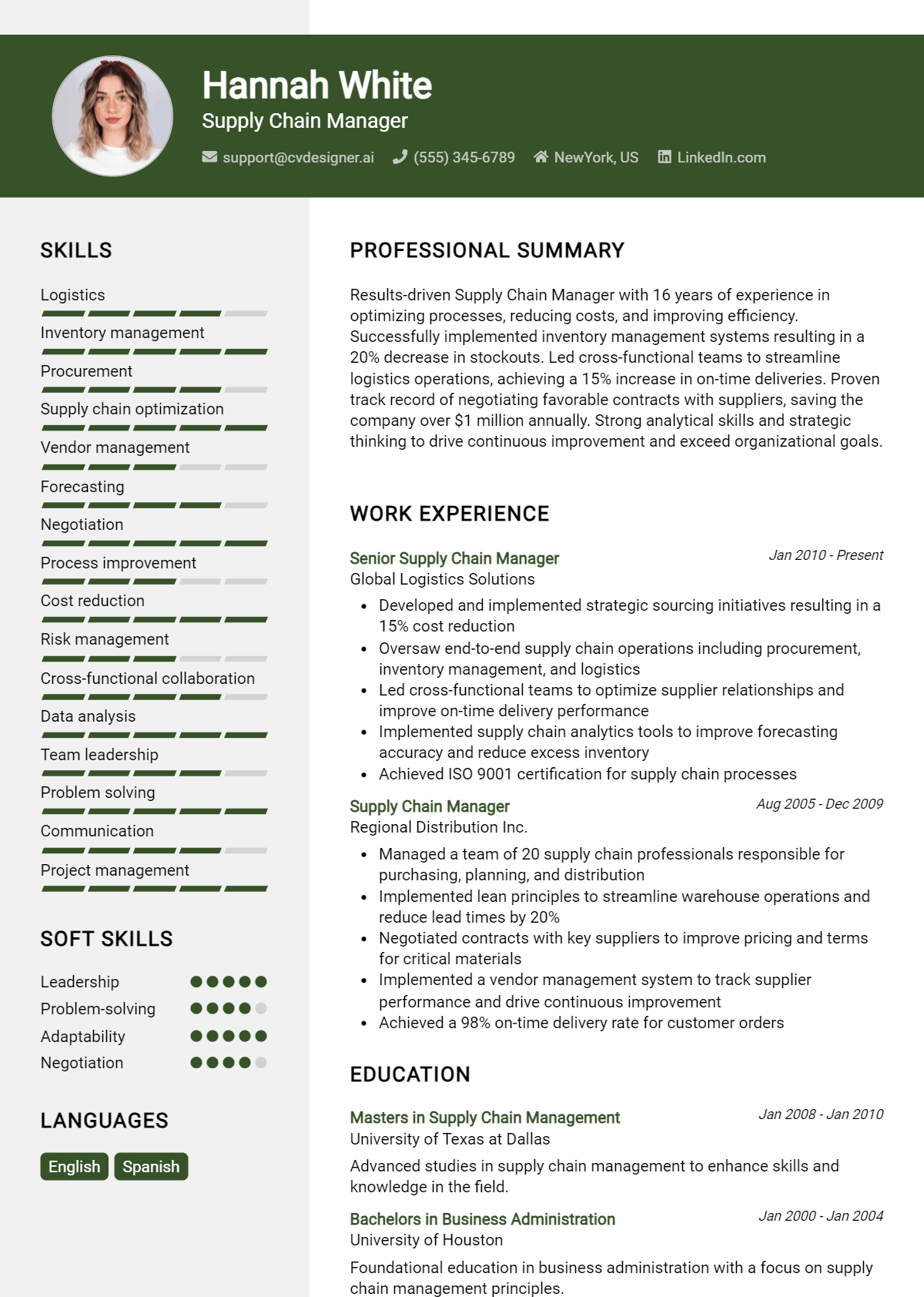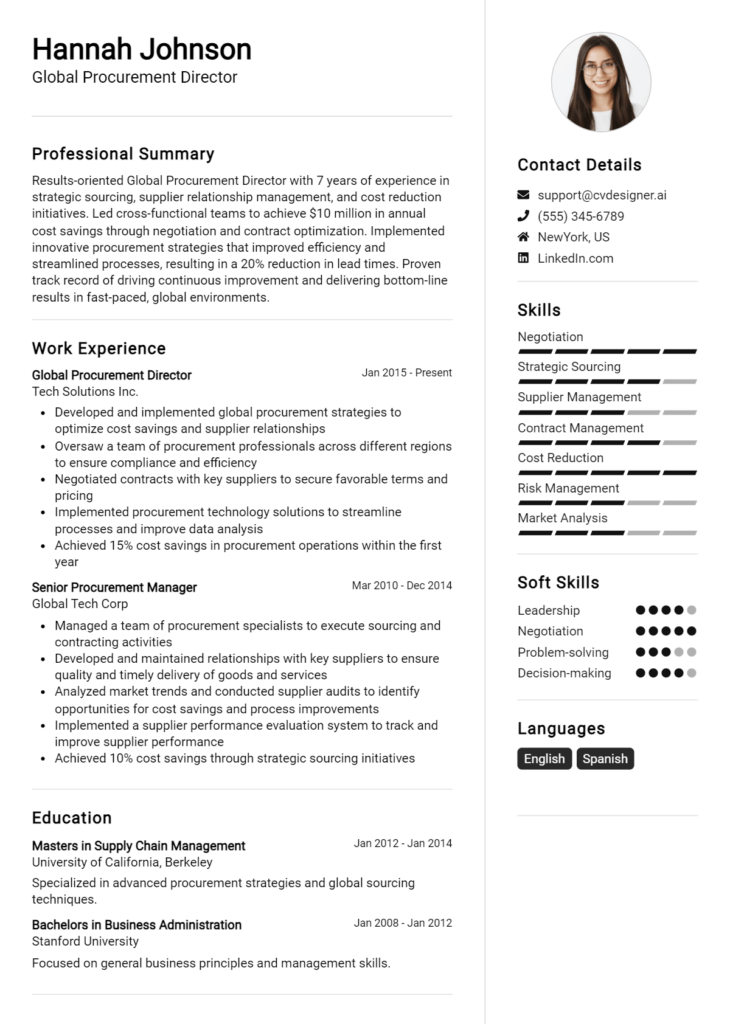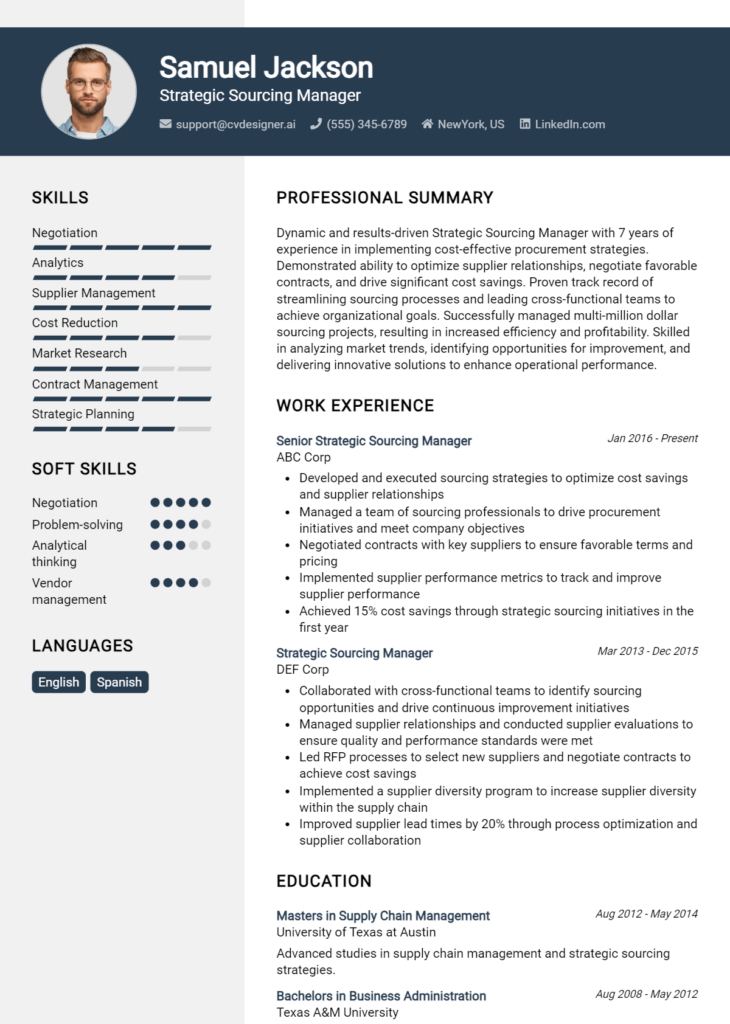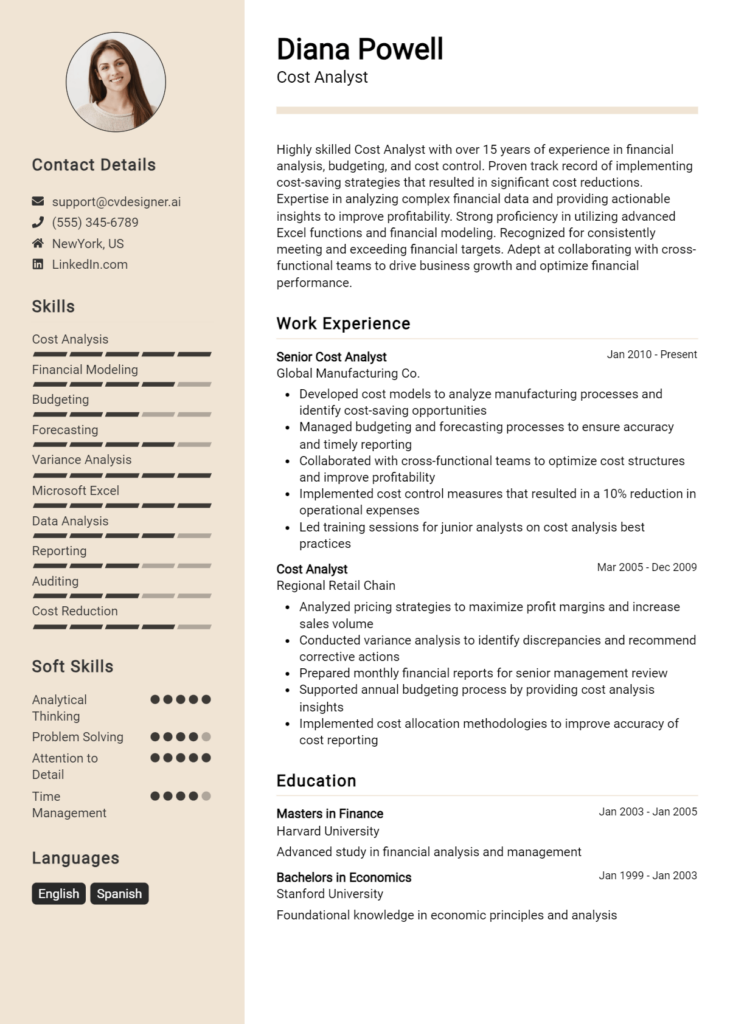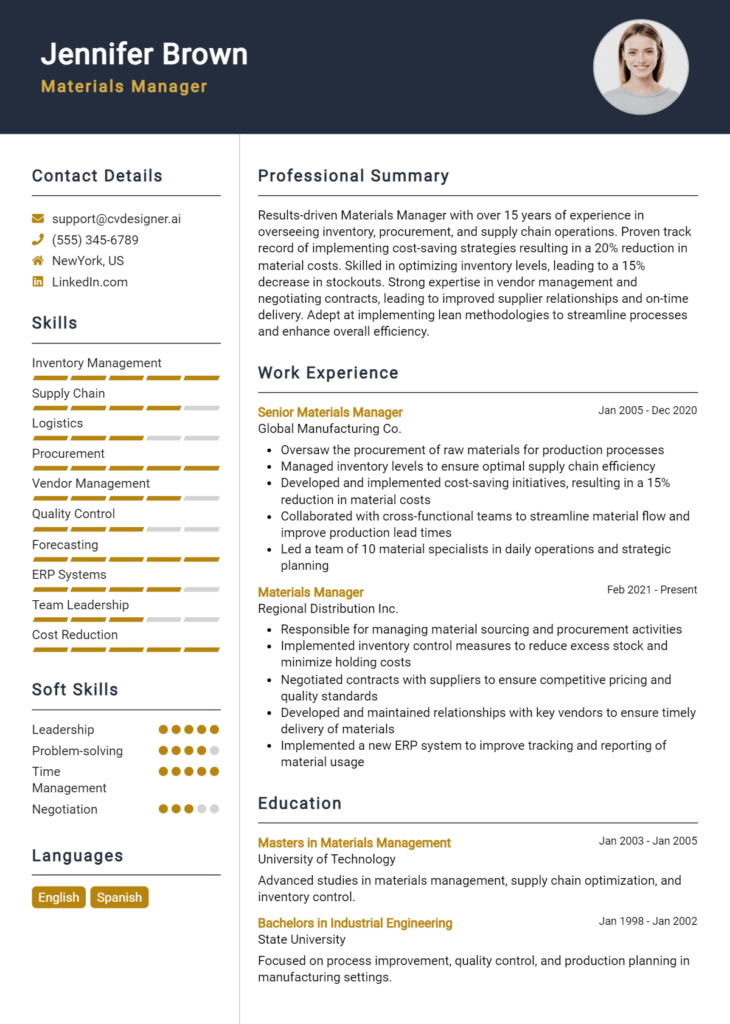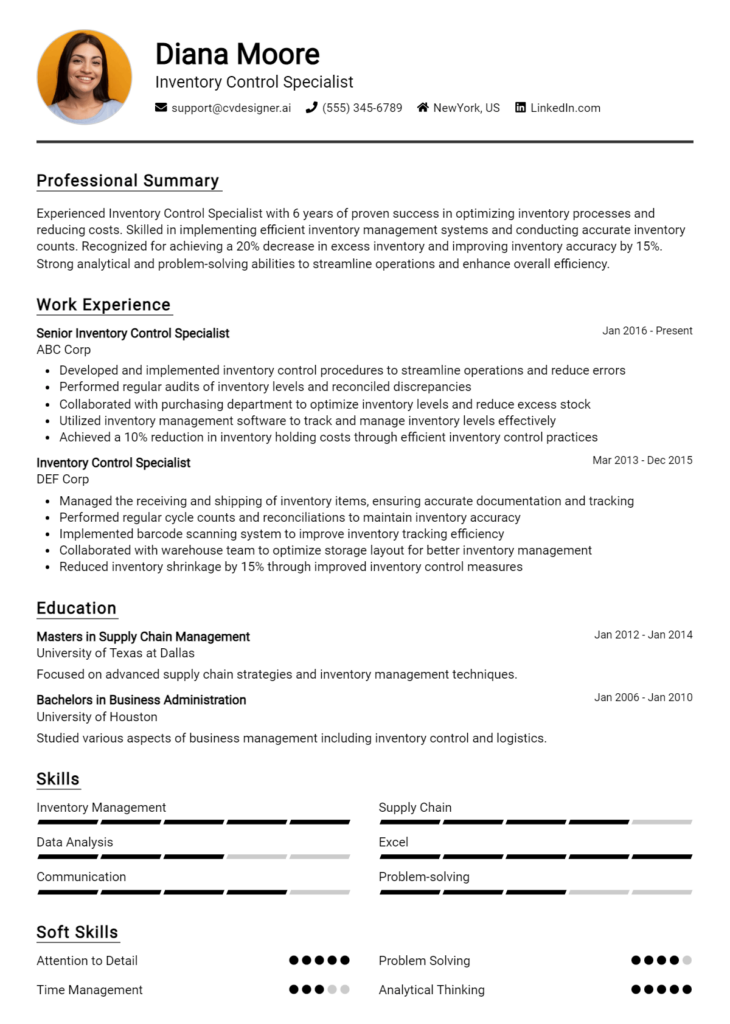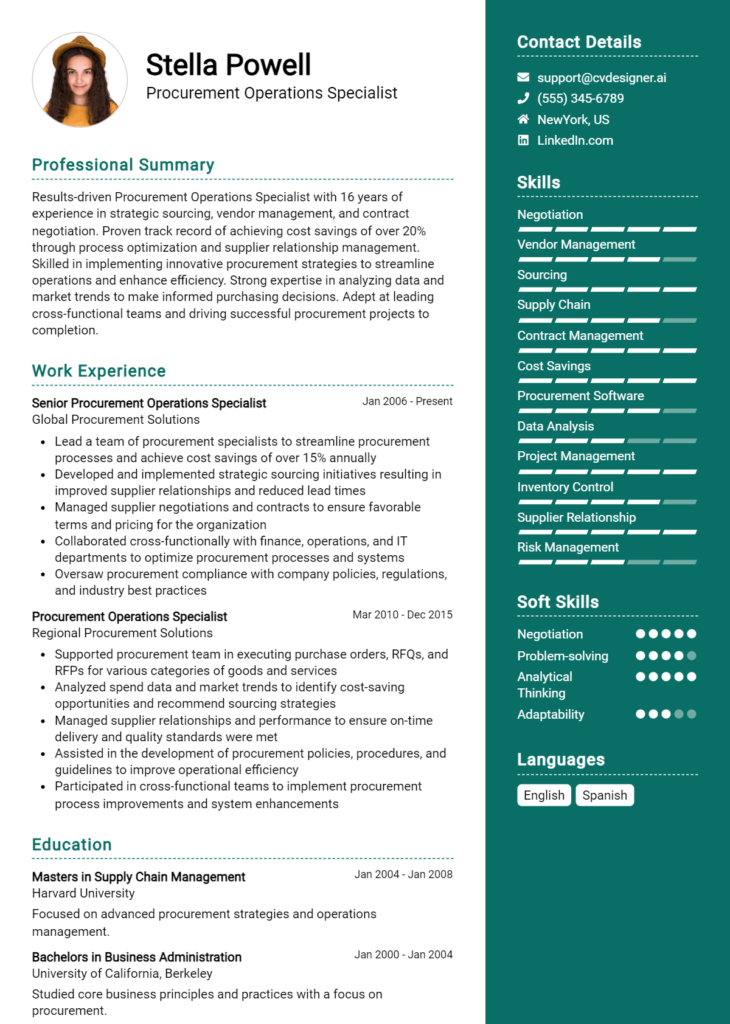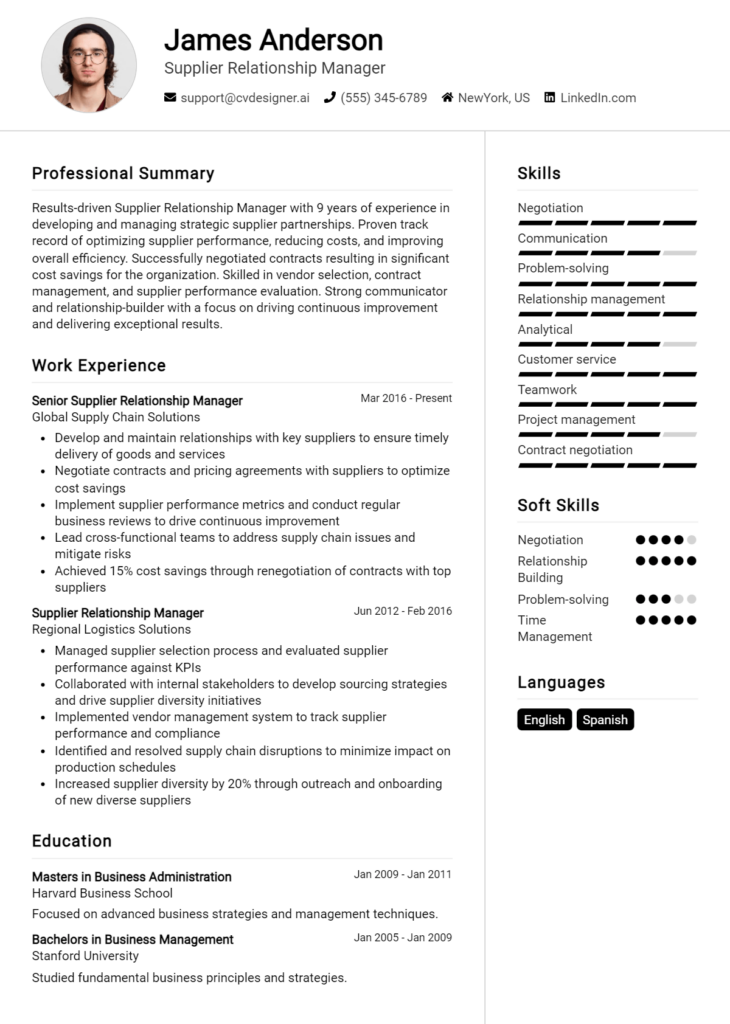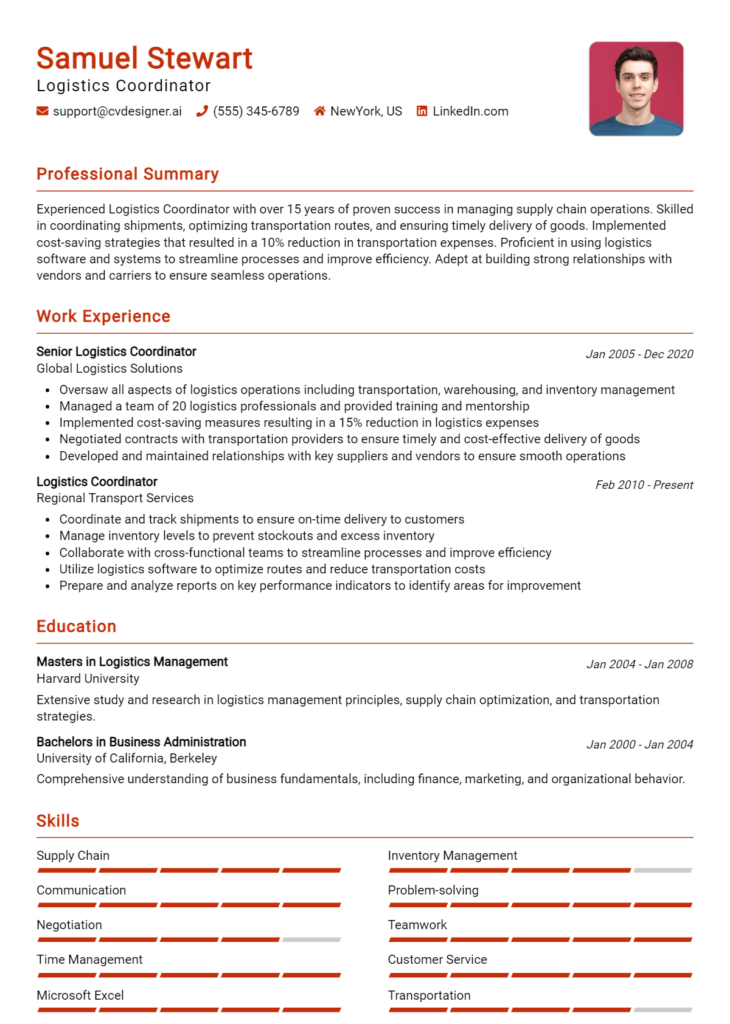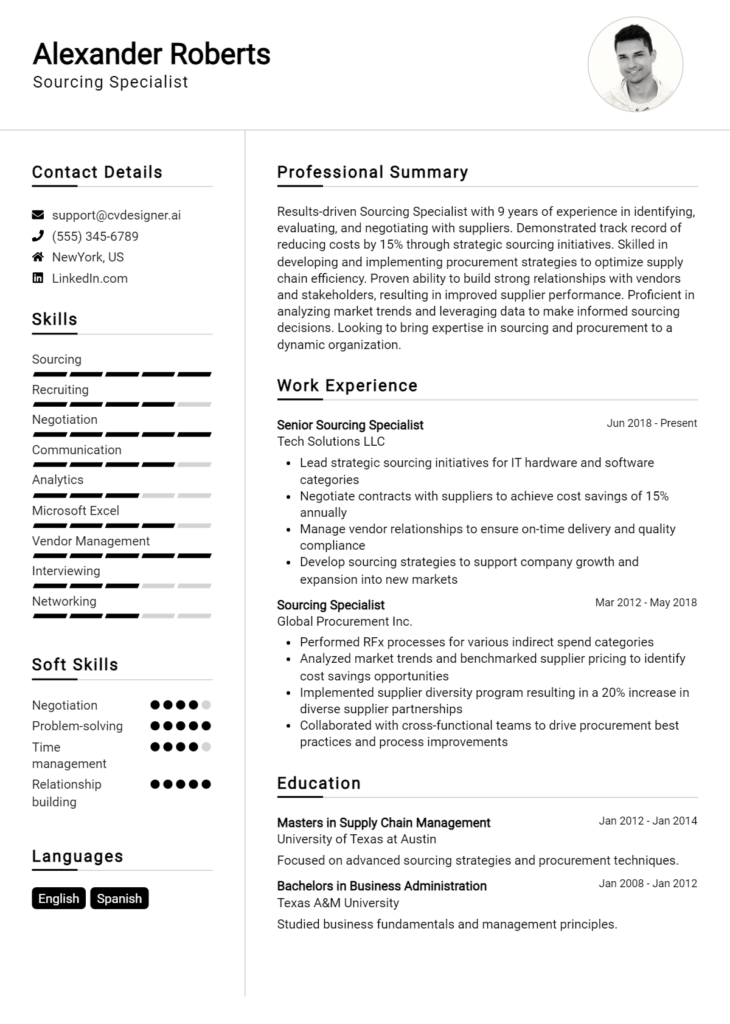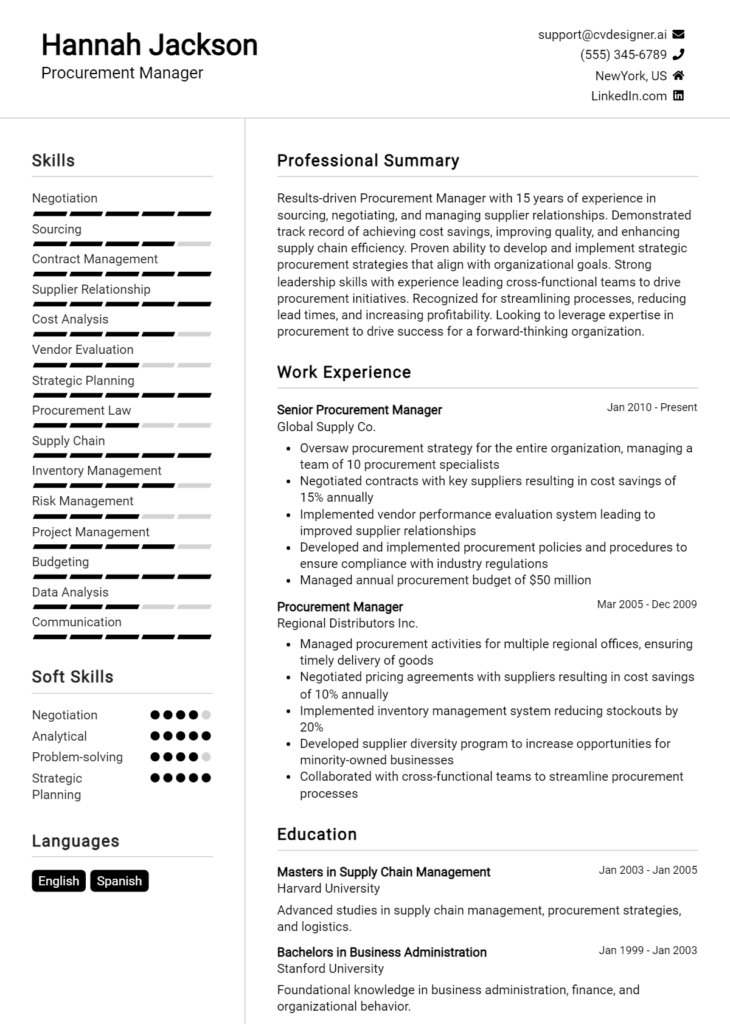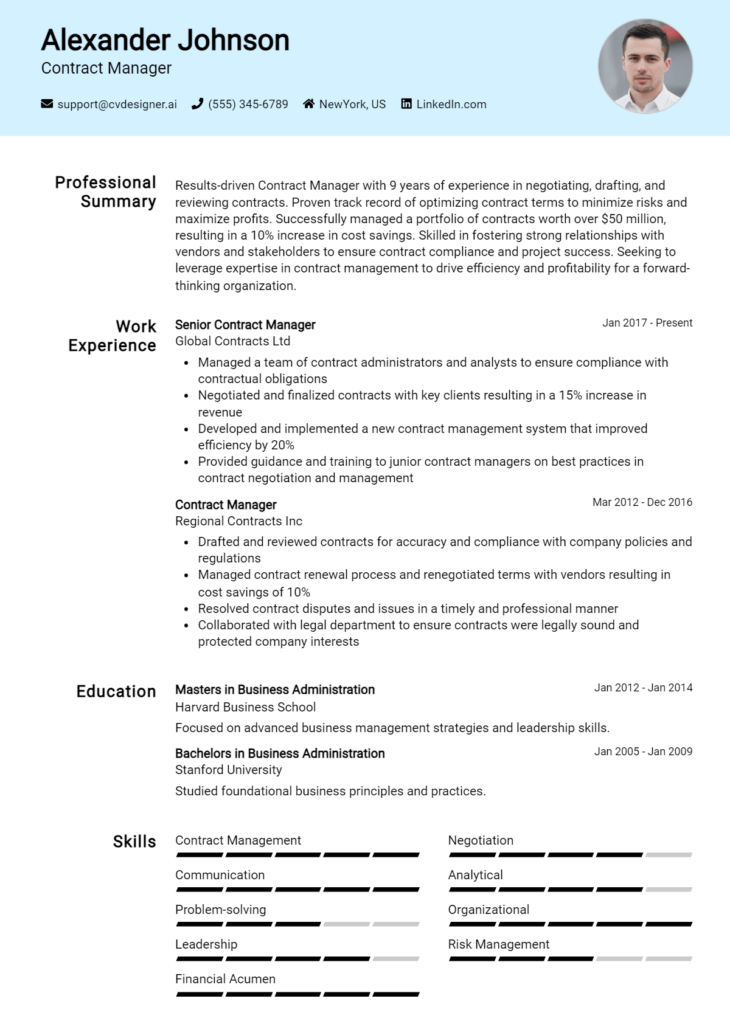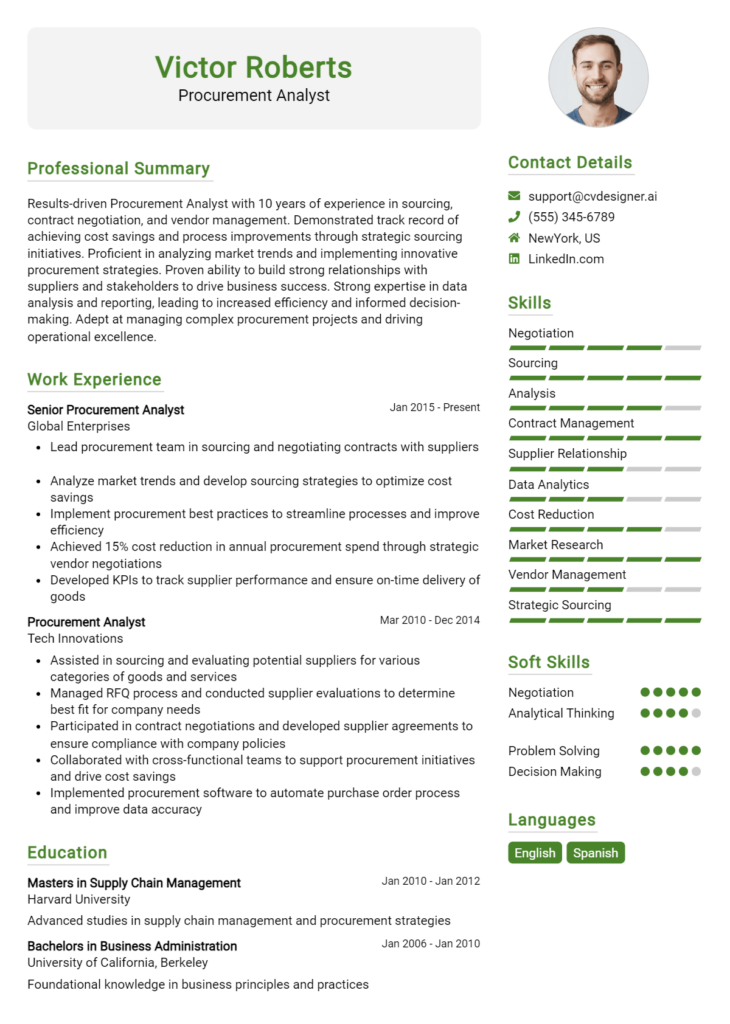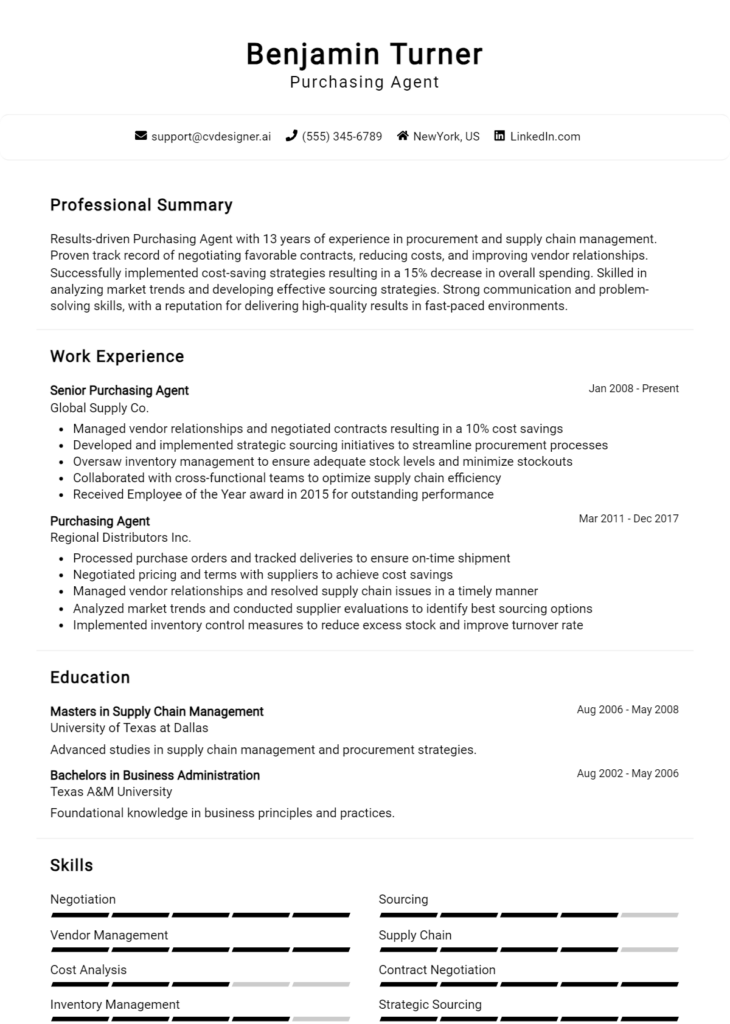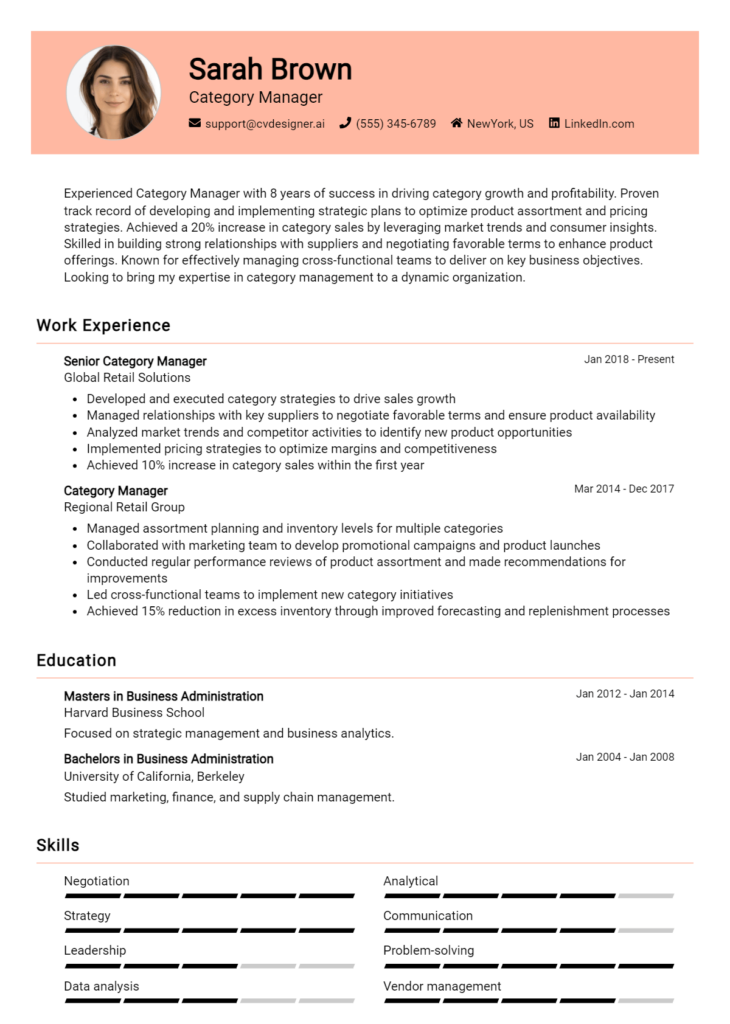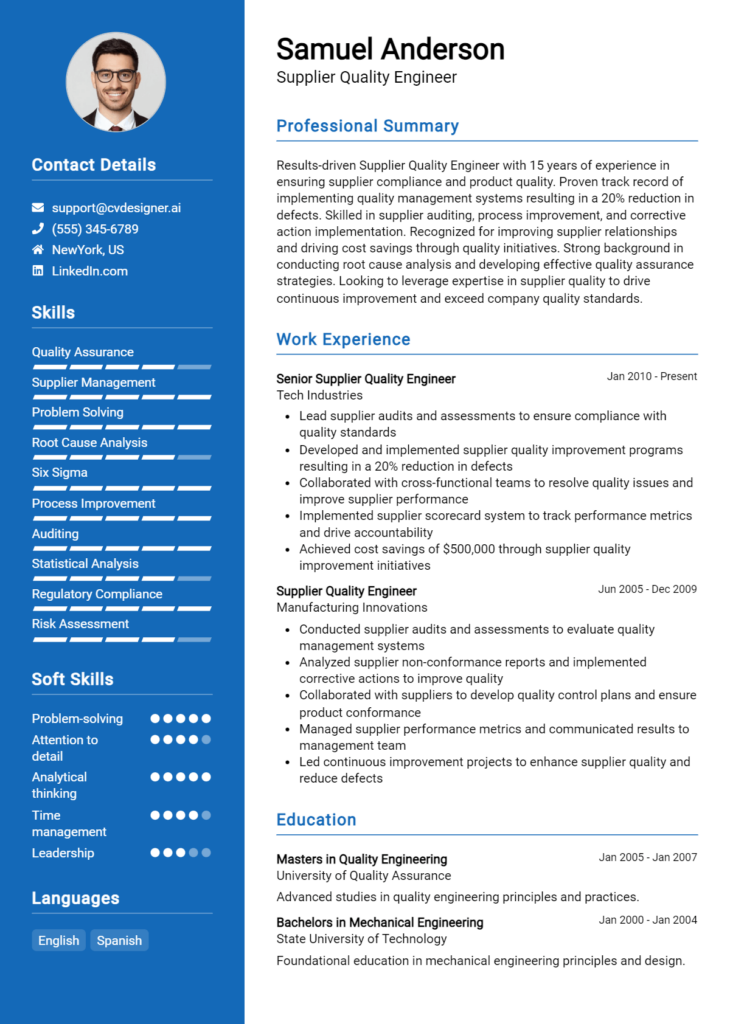Supply Chain Manager Core Responsibilities
A Supply Chain Manager plays a crucial role in linking various departments such as procurement, production, and logistics to ensure seamless operations. Key responsibilities include overseeing inventory management, optimizing transportation, and streamlining processes. Essential skills encompass technical knowledge of supply chain systems, strong operational insights, and advanced problem-solving abilities. These competencies are vital for achieving organizational goals and enhancing efficiency. A well-structured resume should effectively highlight these skills and experiences to attract potential employers.
Common Responsibilities Listed on Supply Chain Manager Resume
- Developing and implementing supply chain strategies
- Coordinating logistics and transportation activities
- Managing inventory levels and forecasting demand
- Collaborating with vendors and suppliers
- Analyzing supply chain performance metrics
- Identifying areas for process improvement
- Leading cross-functional teams for project execution
- Ensuring compliance with industry regulations
- Preparing budget forecasts and financial reports
- Negotiating contracts and agreements
- Implementing technology solutions for supply chain optimization
- Training and mentoring team members
High-Level Resume Tips for Supply Chain Manager Professionals
In today's competitive job market, a well-crafted resume is crucial for Supply Chain Manager professionals seeking to make a lasting impression on potential employers. As the first point of contact between candidates and hiring managers, a resume must effectively showcase not only the candidate's skills but also their achievements in the field. A compelling resume can set a candidate apart in a sea of applicants, demonstrating their value and readiness to tackle the complexities of supply chain management. This guide will provide practical and actionable resume tips specifically tailored for Supply Chain Manager professionals, ensuring that they present their best selves to prospective employers.
Top Resume Tips for Supply Chain Manager Professionals
- Tailor your resume to each job description by incorporating relevant keywords and phrases that match the requirements outlined by the employer.
- Highlight your relevant experience in supply chain management, focusing on roles that demonstrate your ability to optimize processes and drive efficiencies.
- Quantify your achievements wherever possible—use specific metrics, such as percentage improvements, cost savings, or time reductions, to illustrate your impact.
- Showcase industry-specific skills, such as demand forecasting, inventory management, and logistics optimization, to demonstrate your expertise.
- Include certifications related to supply chain management, such as APICS CPIM or CSCMP, to enhance your credibility and show commitment to professional development.
- Utilize a clean and professional format that emphasizes readability, ensuring that key information stands out to hiring managers.
- Incorporate a summary statement at the beginning of your resume that succinctly highlights your qualifications and career objectives.
- Focus on results-driven language—use action verbs to describe your contributions and responsibilities in previous roles.
- Review and edit your resume for clarity and conciseness, eliminating any unnecessary jargon or fluff that may detract from your core qualifications.
By implementing these tips, Supply Chain Manager professionals can significantly increase their chances of landing a job in the field. A well-structured and tailored resume not only showcases their qualifications effectively but also communicates their readiness to take on the challenges of supply chain management, making them an attractive candidate to potential employers.
Why Resume Headlines & Titles are Important for Supply Chain Manager
In the competitive landscape of supply chain management, a well-crafted resume headline or title serves as a critical first impression for candidates seeking to stand out. A strong headline can immediately grab the attention of hiring managers by summarizing a candidate's key qualifications in one impactful phrase. This concise element not only reflects the applicant’s expertise but also aligns with the specific job being applied for. A relevant and focused headline can effectively set the tone for the rest of the resume, enticing employers to delve deeper into the candidate's qualifications and experiences.
Best Practices for Crafting Resume Headlines for Supply Chain Manager
- Keep it concise: Aim for one impactful phrase that encapsulates your qualifications.
- Be role-specific: Tailor the headline to match the specific requirements of the Supply Chain Manager position.
- Highlight key strengths: Focus on your most relevant skills, experiences, or accomplishments that relate to supply chain management.
- Use industry keywords: Incorporate terminology that is commonly used in the supply chain field to enhance relevance.
- Avoid jargon: Ensure that the language used is clear and easily understood by hiring managers.
- Showcase achievements: If possible, quantify your successes to provide measurable evidence of your capabilities.
- Make it unique: Differentiate yourself from other candidates by presenting a distinctive angle or perspective.
- Align with the job description: Mirror the language and priorities outlined in the job posting to demonstrate alignment with the employer's needs.
Example Resume Headlines for Supply Chain Manager
Strong Resume Headlines
"Results-Driven Supply Chain Manager with 10+ Years of Experience in Cost Reduction and Efficiency Improvement"
“Strategic Supply Chain Leader Specializing in Global Logistics and Inventory Optimization”
“Innovative Supply Chain Manager with Proven Track Record in Process Streamlining and Vendor Management”
Weak Resume Headlines
“Experienced Professional Looking for Job”
“Supply Chain Manager”
Strong headlines are effective because they convey specific, relevant information that immediately communicates the candidate's value and expertise in the field of supply chain management. They highlight unique skills and experiences that align with the job requirements, making it easier for hiring managers to see the candidate's potential fit for the role. In contrast, weak headlines tend to be too vague or generic, failing to provide any substantive information that distinguishes the candidate from others, which can lead to missed opportunities in a competitive job market.
Writing an Exceptional Supply Chain Manager Resume Summary
The resume summary is a crucial component of a Supply Chain Manager's resume, serving as the first impression for hiring managers. A well-crafted summary quickly captures attention by highlighting key skills, relevant experience, and notable accomplishments that align with the job requirements. It should be concise and impactful, effectively summarizing the candidate's professional narrative while making a strong case for their candidacy. Tailoring the summary to the specific job the candidate is applying for not only demonstrates their understanding of the role but also showcases their commitment to contributing value to the organization.
Best Practices for Writing a Supply Chain Manager Resume Summary
- Quantify Achievements: Use specific numbers to demonstrate the impact of your contributions, such as cost savings or efficiency improvements.
- Focus on Relevant Skills: Highlight key skills that are directly applicable to the role, such as logistics management, vendor negotiation, and inventory control.
- Tailor the Summary: Customize your summary for each job application by incorporating keywords and phrases from the job description.
- Keep it Concise: Aim for 3-5 sentences that deliver a compelling narrative without overwhelming the reader.
- Showcase Leadership: If applicable, emphasize any leadership roles or team management experience that illustrates your ability to lead supply chain initiatives.
- Incorporate Industry Knowledge: Mention any specific knowledge of supply chain trends or technologies that could benefit the prospective employer.
- Highlight Problem-Solving Abilities: Include examples of how you've successfully navigated challenges in the supply chain process.
- Use Action Verbs: Start sentences with strong action verbs to convey confidence and decisiveness in your role.
Example Supply Chain Manager Resume Summaries
Strong Resume Summaries
Detail-oriented Supply Chain Manager with over 10 years of experience optimizing logistics operations, reducing costs by 25% through strategic vendor negotiations and innovative inventory management techniques.
Results-driven Supply Chain Manager with a track record of increasing supply chain efficiency by 30%, leveraging advanced analytics and process improvements to enhance delivery times and customer satisfaction.
Dynamic Supply Chain Professional skilled in demand forecasting and inventory optimization, achieving a 15% reduction in stockouts and a 20% decrease in excess inventory over the last fiscal year.
Strategic Supply Chain Manager with expertise in managing cross-functional teams, successfully leading a project that streamlined operations and resulted in a 35% improvement in order fulfillment rates.
Weak Resume Summaries
Experienced Supply Chain Manager looking for a new opportunity to use my skills in supply chain management.
Supply Chain Manager with a good background in logistics and management, seeking to contribute to a company’s success.
The strong resume summaries are effective because they provide quantifiable achievements, demonstrate specific skills, and relate directly to the demands of the role. They convey the candidate's expertise and the value they can bring to potential employers. In contrast, the weak summaries lack detail and specificity, making them generic and less appealing to hiring managers who are seeking candidates that can demonstrate their impact and relevance to the position.
Work Experience Section for Supply Chain Manager Resume
The work experience section of a Supply Chain Manager resume is crucial for demonstrating the candidate's technical skills, leadership abilities, and capacity to deliver high-quality products. This section serves as a platform to showcase not only the roles and responsibilities held in previous positions but also the tangible outcomes achieved through strategic management and collaboration. By quantifying achievements—such as cost reductions, efficiency improvements, or successful project completions—and aligning experiences with industry standards, candidates can effectively illustrate their value to potential employers in the competitive field of supply chain management.
Best Practices for Supply Chain Manager Work Experience
- Use action verbs to describe your contributions and responsibilities.
- Quantify achievements with metrics, such as percentage improvements or cost savings.
- Highlight specific technical skills, such as proficiency in supply chain software or methodologies.
- Emphasize examples of team leadership and collaborative projects.
- Tailor experience descriptions to align with the job description and industry standards.
- Include relevant certifications or training that enhance your expertise.
- Showcase problem-solving scenarios where you successfully navigated challenges.
- Maintain a clear and concise format for easy readability.
Example Work Experiences for Supply Chain Manager
Strong Experiences
- Led a cross-functional team to implement a new inventory management system, resulting in a 25% reduction in stock discrepancies over six months.
- Negotiated contracts with suppliers that achieved a 15% cost saving on raw materials, enhancing overall profitability for the quarter.
- Developed and executed a logistics optimization strategy that improved delivery times by 30%, significantly increasing customer satisfaction ratings.
- Managed a team of 10 in the execution of a supply chain transformation project that increased operational efficiency by 40% within one year.
Weak Experiences
- Responsible for managing supply chain operations.
- Worked with vendors and suppliers.
- Ensured products were delivered on time.
- Participated in team meetings regarding inventory.
The examples categorized as 'strong experiences' are effective because they provide specific, quantifiable outcomes that demonstrate the candidate's impact on the organization. They illustrate leadership, problem-solving abilities, and technical expertise, making a compelling case for the candidate's qualifications. In contrast, the 'weak experiences' fail to convey meaningful contributions or achievements, relying on vague descriptions that do not highlight the candidate's capabilities or the value brought to previous roles.
Education and Certifications Section for Supply Chain Manager Resume
The education and certifications section of a Supply Chain Manager resume is crucial as it showcases the candidate's academic background, relevant certifications, and commitment to continuous learning. Employers look for evidence of formal education and specialized training that aligns with the complexities of supply chain management. By providing relevant coursework, industry-recognized certifications, and ongoing professional development, candidates can significantly enhance their credibility and demonstrate their alignment with the job role, making them more attractive to potential employers.
Best Practices for Supply Chain Manager Education and Certifications
- Prioritize relevant degrees, such as a Bachelor's or Master's in Supply Chain Management, Logistics, or Business Administration.
- Include industry-recognized certifications like APICS CPIM, CSCP, or Six Sigma Green Belt.
- Detail relevant coursework that showcases specialized knowledge, such as inventory management or procurement strategies.
- Highlight any leadership or project management training that complements supply chain roles.
- Keep the section updated with the most recent certifications and educational achievements.
- Clearly indicate completion dates for certifications to demonstrate ongoing professional development.
- Use clear and concise language to describe educational achievements and certifications.
- Tailor this section to align with the specific requirements of the job description.
Example Education and Certifications for Supply Chain Manager
Strong Examples
- Bachelor of Science in Supply Chain Management, University of Logistics, Graduated May 2020
- Certified Supply Chain Professional (CSCP), APICS, Earned June 2023
- Lean Six Sigma Green Belt Certification, Institute of Lean Management, Completed March 2022
- Advanced Procurement Strategies Course, Online Learning Platform, Completed January 2023
Weak Examples
- Bachelor of Arts in English Literature, University of Arts, Graduated May 2010
- Certification in Basic Computer Skills, Local Community College, Completed December 2018
- High School Diploma, Graduated June 2005
- Outdated Certification in Inventory Management, Old Institution, Issued 2015
The strong examples listed above are considered relevant and impactful because they reflect degrees and certifications directly applicable to supply chain management, demonstrating a solid educational foundation and a commitment to professional growth. In contrast, the weak examples lack relevance to the role of a Supply Chain Manager, showcasing outdated or unrelated qualifications that do not contribute to the candidate's suitability for the position.
Top Skills & Keywords for Supply Chain Manager Resume
In the competitive field of supply chain management, a well-crafted resume is crucial for making a strong impression on potential employers. Highlighting relevant skills can set a candidate apart from the crowd, showcasing their ability to effectively manage and optimize supply chain operations. Both hard and soft skills play a pivotal role in this profession, as they reflect the technical expertise and interpersonal attributes necessary for success. By incorporating the right skills into a resume, supply chain managers can demonstrate their capability to handle complex logistics and foster effective collaboration with various stakeholders.
Top Hard & Soft Skills for Supply Chain Manager
Soft Skills
- Strong communication skills
- Leadership and team management
- Problem-solving abilities
- Negotiation skills
- Adaptability and flexibility
- Analytical thinking
- Time management
- Conflict resolution
- Interpersonal skills
- Decision-making capabilities
- Strategic thinking
- Customer service orientation
- Emotional intelligence
- Collaboration and teamwork
Hard Skills
- Proficiency in supply chain software (e.g., SAP, Oracle)
- Inventory management techniques
- Demand forecasting
- Data analysis and reporting
- Knowledge of logistics and transportation
- Procurement and sourcing strategies
- Understanding of lean manufacturing principles
- Regulatory compliance and risk management
- Project management skills
- Financial acumen related to supply chain
- Supply chain optimization methodologies
- Supply chain strategy development
- Quality control and assurance
- Warehouse management systems (WMS)
By effectively showcasing these essential hard and soft skills, candidates can enhance their work experience and make a compelling case for their suitability for the role of Supply Chain Manager.
Stand Out with a Winning Supply Chain Manager Cover Letter
Dear [Hiring Manager's Name],
I am writing to express my interest in the Supply Chain Manager position at [Company Name] as advertised on [Job Board/Company Website]. With over [X years] of experience in supply chain management and a proven track record of optimizing processes, reducing costs, and enhancing overall efficiency, I am excited about the opportunity to contribute to your team. My background in logistics, procurement, and inventory management, combined with my analytical skills, uniquely positions me to drive success in your supply chain operations.
In my previous role at [Previous Company Name], I successfully led a cross-functional team to streamline our supply chain processes, resulting in a 20% reduction in lead times and a 15% decrease in operational costs. By implementing advanced forecasting techniques and leveraging data analytics, I improved inventory turnover rates and minimized stockouts, ensuring that our production schedules remained uninterrupted. My ability to build strong relationships with suppliers and stakeholders has enabled me to negotiate favorable contracts and ensure timely delivery of materials, which I believe would be invaluable in the fast-paced environment at [Company Name].
I am particularly impressed by [specific aspect of the company or its supply chain practices], and I am eager to bring my expertise in continuous improvement and strategic planning to further enhance your supply chain operations. I am confident that my proactive approach and commitment to excellence will make a significant impact at [Company Name]. I look forward to the possibility of discussing how my skills and experiences align with your needs and contribute to the overall success of your organization.
Thank you for considering my application. I hope to have the opportunity to speak with you soon to discuss my fit for this exciting role.
Sincerely,
[Your Name]
[Your Phone Number]
[Your Email Address]
Common Mistakes to Avoid in a Supply Chain Manager Resume
When crafting a resume for a Supply Chain Manager position, it's crucial to avoid common pitfalls that can undermine your chances of landing an interview. A well-structured resume not only highlights your qualifications but also communicates your understanding of the complexities in supply chain management. Here are several mistakes applicants frequently make that can detract from their overall presentation:
Vague Job Descriptions: Failing to provide specific details about past roles can leave hiring managers unclear about your actual responsibilities and achievements.
Ignoring Quantifiable Achievements: Not including metrics or specific outcomes (e.g., cost savings, efficiency improvements) can make your accomplishments seem less impactful.
Using Industry Jargon Excessively: Overloading your resume with technical terms may alienate recruiters who may not have a supply chain background.
Neglecting Soft Skills: Focusing solely on technical expertise while ignoring essential soft skills, such as communication and leadership, can present an incomplete picture of your capabilities.
One-Size-Fits-All Approach: Submitting the same resume for different positions without tailoring it to specific job descriptions can signal a lack of genuine interest or effort.
Poor Formatting and Layout: A cluttered or hard-to-read resume can detract from your qualifications and make it difficult for hiring managers to extract key information quickly.
Omitting Relevant Certifications: Failing to list certifications related to supply chain management (e.g., APICS, Six Sigma) can result in missed opportunities, as these credentials are often highly valued.
Not Including Keywords: Many companies use applicant tracking systems (ATS) to filter resumes. Not incorporating relevant keywords from the job description can prevent your resume from getting noticed.
Conclusion
As a Supply Chain Manager, you play a crucial role in optimizing the flow of goods and services, ensuring efficiency and cost-effectiveness in operations. Key responsibilities include overseeing inventory management, coordinating logistics, forecasting demand, and collaborating with suppliers and vendors to enhance supply chain performance. Your ability to analyze data, manage risks, and implement best practices is essential for driving operational excellence.
Additionally, strong leadership and communication skills are vital for fostering teamwork and building relationships across various departments and stakeholders. As the industry continues to evolve with advancements in technology and sustainability practices, staying updated on trends and innovations will further enhance your effectiveness in this role.
To ensure that your qualifications and experiences are effectively communicated to potential employers, it’s important to have a well-crafted resume. We encourage you to take the time to review your Supply Chain Manager resume and make necessary updates. Utilize tools available to you, such as resume templates, resume builder, resume examples, and cover letter templates. These resources can help you create a standout resume that highlights your skills and accomplishments, making you a competitive candidate in the job market. Don’t miss the opportunity to present yourself in the best light possible!

